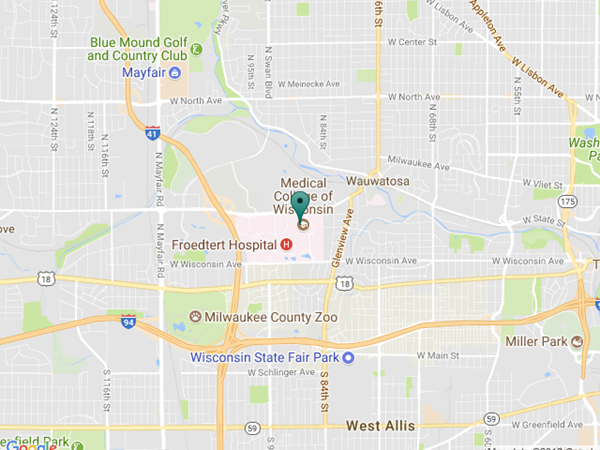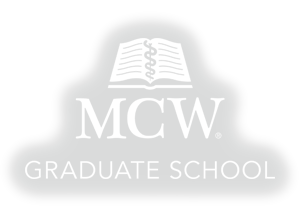Doctor of Public Health Program at the Medical College of Wisconsin

DrPH and MPH Programs Receive Maximum 7-Year Reaccreditation by the Council on Education for Public Health
Please contact Kim Contardi at kcontardi@mcw.edu, if you would like a copy of the accreditation report and final self-study.
Mission
Things to Know
Years
Credits
Faculty
Why Join the Doctor of Public Health Program at MCW?
Applied Leadership
Graduates of the program will be prepared to work in senior level leadership positions in a variety of settings such as:
- Governmental agencies
- Non-governmental organizations
- Hospitals and healthcare systems
- Community-based organizations
- Academic institutions
Online Program
All course work is completed with a combination of synchronous and asynchronous methods.
- Entirely online with 4-day in-person summer visit
- Virtual lectures from community-engaged researchers
- Learn alongside students from across the country
- Designed to be completed in 3 years
Community Focused
Engage with the community both at MCW and through applied knowledge.
- Cohort-based model
- Health equity focus
- CEPH accredited program
- Support from the President and Deans of Graduate School and Medical School
CEPH Accreditation
The Medical College of Wisconsin (MCW) is accredited by the Higher Learning Commission (HLC) and the Liaison Committee on Medical Education (LCME). The DrPH program is also individually accredited by the Council on Education for Public Health (CEPH). The Council on Education for Public Health (CEPH) is an independent agency that accredits schools of public health and public health programs offered in settings other than schools of public health.
Doctor of Public Health Program Details
Admissions
Admissions Requirements
- A master’s degree from an accredited school or program in public health, a master’s degree in a related field, a doctoral degree, or a professional degree (e.g., MD, JD, PharmD). Students without a master’s degree in public health from an accredited school of public health or program may be required to complete an online core public health course.
- Grade point average (GPA) of at least 3.0 in prior graduate study
- A current resume or CV
- Three letters of recommendation
- Transcripts from all undergraduate and post-baccalaureate work
- Personal statement that addresses the following questions:
- Describe your academic and career goals and how they align with pursuing the DrPH degree.
- Describe a public health issue that interests you.
- Describe how you learn best.
- Describe your most significant professional leadership accomplishment.
- What do you hope to gain from and contribute to the DrPH program?
- At least three years of post-graduate experience in public health, healthcare, or a related field with management or leadership responsibilities
Competencies and Curriculum
Foundational Public Health Knowledge
Students will be grounded in foundational public health knowledge prior to matriculation. The program validates foundational public health knowledge through the completion of a CEPH-accredited master’s degree or completion of an online module that addresses the 12 learning objectives.
Profession & Science of Public Health
- Explain public health history, philosophy, and values
- Identify the core functions of public health and the 10 Essential Services
- Explain the role of quantitative and qualitative methods and sciences in describing and assessing a population’s health
- List major causes and trends of morbidity and mortality in the US or other community relevant to the school or program
- Discuss the science of primary, secondary, and tertiary prevention in population health, including health promotion, screening, etc.
- Explain the critical importance of evidence in advancing public health knowledge
Factors Related to Human Health
- Explain effects of environmental factors on a population’s health
- Explain biological and genetic factors that affect a population’s health
- Explain behavioral and psychological factors that affect a population’s health
- Explain the social, political, and economic determinants of health and how they contribute to population health and health inequities
- Explain how globalization affects global burdens of disease
- Explain an ecological perspective on the connections among human health, animal health and ecosystem health (e.g. One Health)
DrPH Competencies
Upon completion of the DrPH program, students will demonstrate knowledge of the 20 foundational CEPH competencies as well as the 5 DrPH public health practice competencies. Students will achieve these competencies through synchronous and asynchronous coursework, practical experiences, and other applied activities. In addition, the curriculum is grounded in the seven key practices necessary to be a high achieving Community Health Strategist.
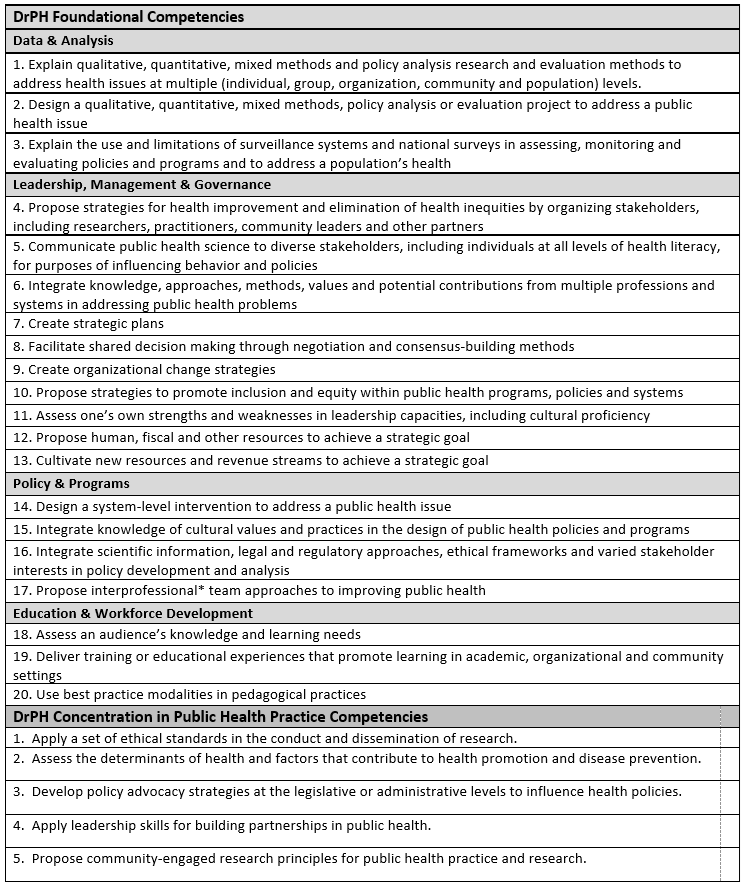
Community Health Strategist Practices
Practice 1: Adopt and adapt strategies to combat the evolving leading causes of illness, injury and premature death.
Practice 2: Develop strategies for promoting health and well-being that work most effectively for communities of today and tomorrow
Practice 3: Community health strategists will identify, analyze and distribute information from new, big, and real time data sources
Practice 4: Build a more integrated, effective health system through collaboration between clinical care and public health
Practice 5: Collaborate with a broad array of allies – including those at the neighborhood level and the non-health sectors – to build healthier and more vital communities
Practice 6: Replace outdated organizational practices with state-of-the -art business, accountability, and financing systems
Practice 7: Work with corresponding federal partners – ideally, a federal Community Health Strategist – to effectively meet the needs of their communities
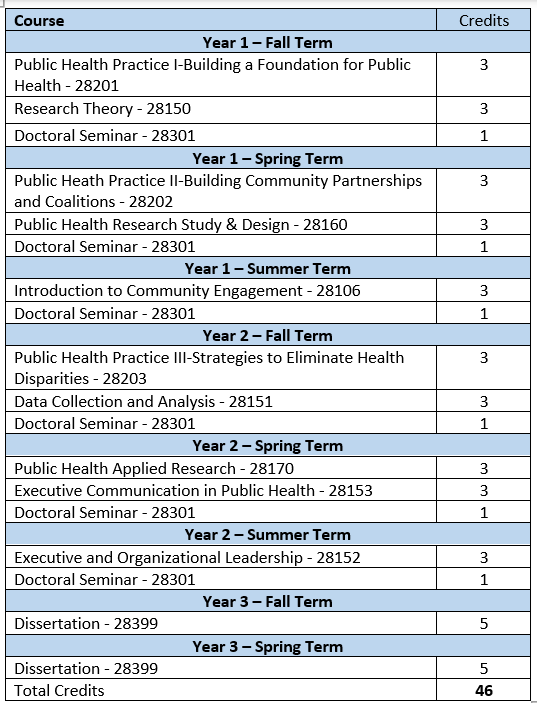
Please refer to the Academic Bulletin for full course descriptions.
Current Students
Tuition and Fees
If you have questions regarding tuition or your account, please contact the Office of Student Accounts, at (414) 955-8172 or mcwtuition@mcw.edu. Please refer to the All Student Handbook (PDF) for tuition payment policies and information.
Current MCW Employees
Tuition Course Approval Form - Human Resources (PDF)
Financial Aid
Students seeking financial aid please visit the Financial Aid Office website.
Late Fees
There is a $250 late payment fee for tuition not paid on time according to the Tuition Payments policy in the All Student Handbook (PDF).
Program Specific Questions:
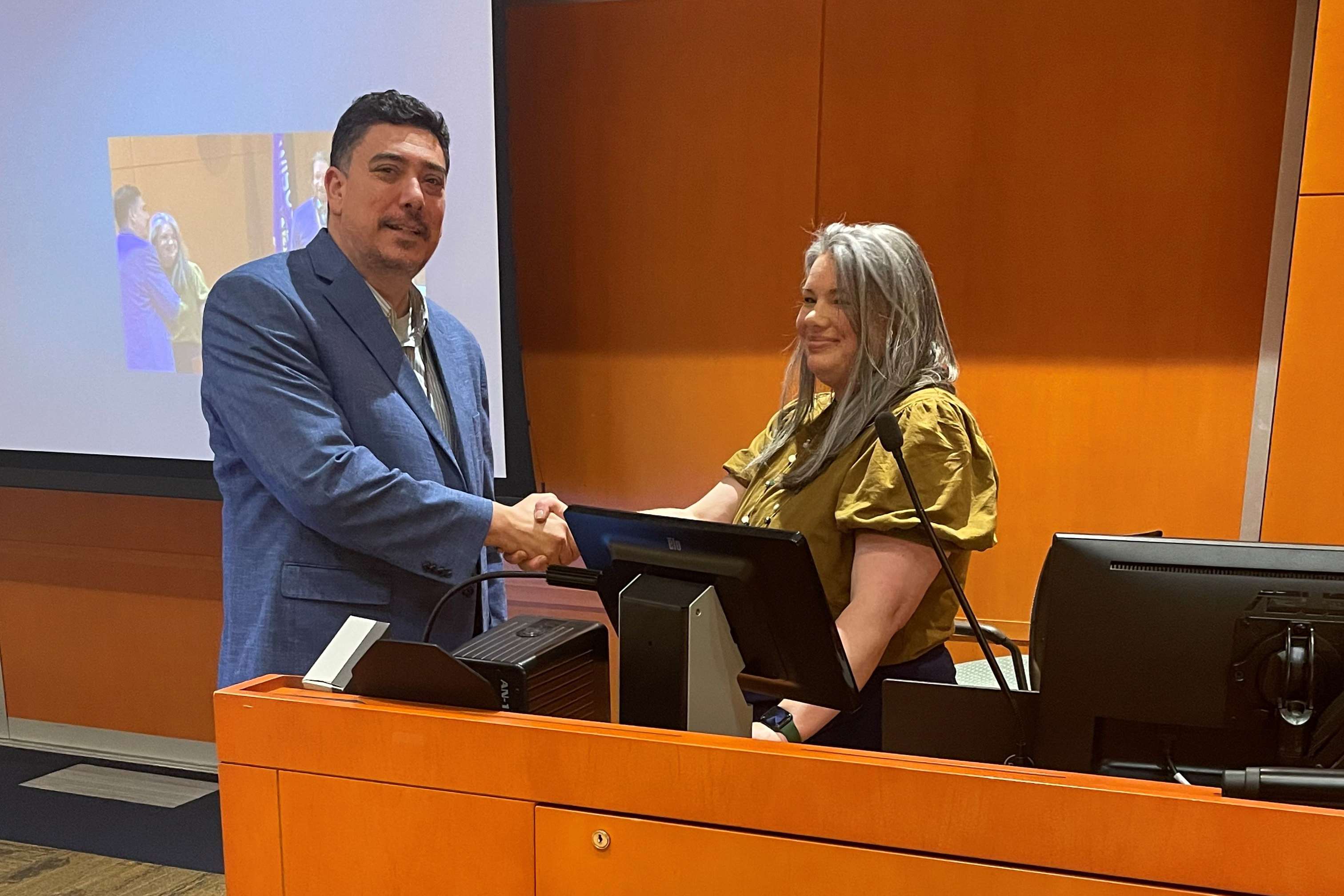
MCW Specific Questions:

Application Specific Questions:

Academic and Student Services
-
Student Services
Review information regarding financial aid, health and wellness, student inclusion, MCW libraries, and more.
LEARN MORE -
Tuition and Fees
Review financial aid and tuition information by school and program.
Financial Aid -
Academic Consultation
We support student success by assisting with a broad array of student needs and concerns. These include the acclimation to increased academic demand and navigation of institutional policies and requirements.
Get a Consult
Contact the MCW DrPH Program
Education Program Coordinator III, Doctor of Public Health (DrPH)
sedminster@mcw.edu
